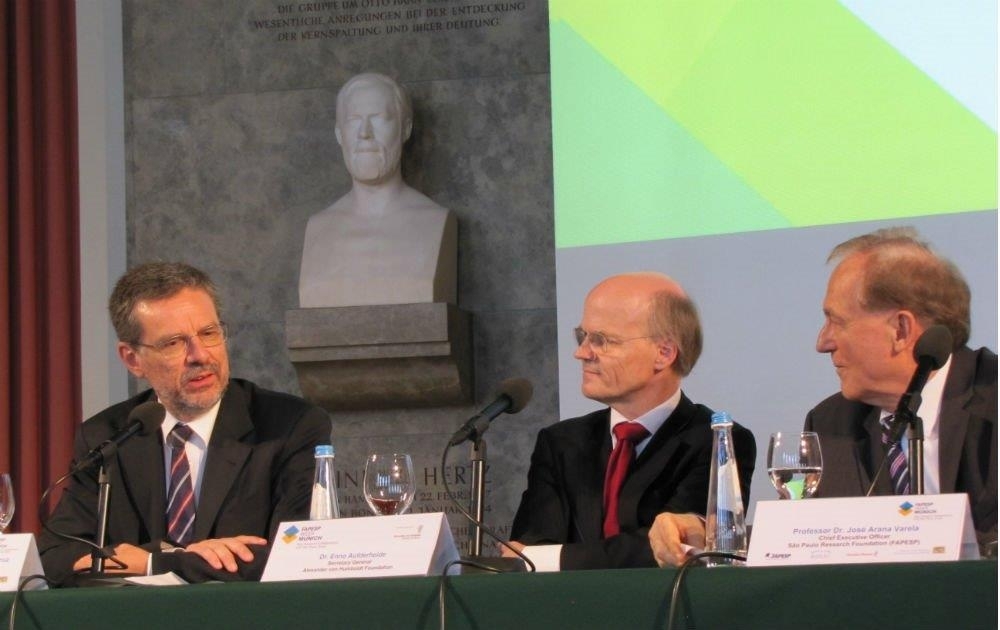

Experts talk about the obstacles and incentives to collaboration between researchers from different countries (photo: H.Shimizu)
Experts talk about the obstacles and incentives to collaboration between researchers from different countries
Experts talk about the obstacles and incentives to collaboration between researchers from different countries

Experts talk about the obstacles and incentives to collaboration between researchers from different countries (photo: H.Shimizu)
By Heitor Shimizu, in Munich
Agência FAPESP – “If we really want thought-provoking scientific research cooperation and joint projects that consider what was once the unthinkable, we have to do more than just place scientists from one country in contact with those of another, or allow them just to visit each other,” said Enno Aufderheide, Secretary General of the Alexander von Humboldt Foundation during FAPESP Week Munich, the symposium sponsored by FAPESP and the Bavarian University Center for Latin America (BAYLAT) in Munich, October 15-17, 2014.
“We have to make it possible for researchers to spend time in other countries. We have to allow them to get a perspective about the people who live there and who they work with, so that there can be real interaction between the two sides,” Aufderheide said.
Aufderheide was one of the speakers on the panel, “International Scientific Collaboration and Networking, and Excellence in Universities– Good Practices,” along with Christian Müller, Director of the Department of Strategy and Knowledge Management at the German Academic Exchange Service (DAAD); Torsten Nyncke, Regional Director for Europe, Brazil and Israel of the Fraunhofer Society; and Carlos Henrique de Brito Cruz, Scientific Director of FAPESP. The panel was moderated by FAPESP Chief Executive Officer, José Arana Varela.
Founded in 1953, and with a history of 15 of its researchers having received the Nobel Prize, the Alexander von Humboldt Foundation offers assistance that enables researchers from other countries to spend time at German institutions and, according to Aufderheide, it has put together a global network of research excellence that currently numbers 26,000 researchers from nearly 140 countries who are receiving or have received Foundation support at some point in their careers.
“This network supports multilateral collaboration in several subjects, benefiting both the individuals who are seeking scientific conquests, as well as the countries who want to become part of a global endeavor to acquire knowledge,” he said.
According to Aufderheide, the needs and opportunities for international collaborative research have increased substantially in the last decade. “And countries that are not well-integrated into international networks run the risk of missing out on important opportunities to recruit talent,” he said.
Müller talked about the long history of cooperation between Brazilian institutions, especially research-sponsoring agencies. For example, the DAAD has had a cooperation agreement with FAPESP since 1988, which has resulted in the awarding of more than 130 grants and scholarships.
Nyncke talked about Fraunhofer’s internationalization strategy, which is based on adding scientific value to the German association, and on the positive effects of collaboration for both Germany and the partner country.
“Brazil has been an important partner to Fraunhofer. More than 30 institutes of the Society have taken part in collaborative efforts with Brazilian partners. Two Fraunhoufer Project Centers, one in the state of São Paulo, are proof of the Society’s long-term commitment to collaborative research with Brazil,” he said.
Brito Cruz pointed out the internationalization program for research conducted in the state of São Paulo, supported by FAPESP through more than 100 cooperation agreements with institutions from other countries and through various funding instruments.
“Science is a social undertaking. It’s not just an individual endeavor. Just as science depends on individual genius, it also depends on communication and working together, especially among the world’s best researchers. This is one of the reasons why we are looking to develop international collaborative research. We want the best scientists in São Paulo to work with the best scientists in the world, more than they have in the past,” he said.
The scientific director also pointed out that in addition to allowing São Paulo researchers to go to other countries to take part in binational or international projects, FAPESP has enabled researchers from other countries to come to Brazil.
“In 2013, we brought one researcher to Brazil every workday [weekday] and we want to increase that number to two a day,” he said. “Also last year, 20% of FAPESP’s post-doctoral scholarships were awarded to individuals from other countries.”
“There are a lot of initiatives for internationalizing Brazilian research and we’re working hard on this, but of course, there are many obstacles. One of them is the fact that in Brazil, we speak Portuguese, a language not spoken in most of the world. Another point is that the country is far away from the world’s major science center,” Brito Cruz said.
“Yes, there are many obstacles, but there are also many opportunities. At FAPESP, we’ve created incentives and opportunities that allow these obstacles to be overcome and the results have been very good. In 2005, for example, we had two or three FAPESP grants to finance collaborative research work in partnership with organizations from other countries. Today, there are nearly 200,” said Brito Cruz.
Republish
The Agency FAPESP licenses news via Creative Commons (CC-BY-NC-ND) so that they can be republished free of charge and in a simple way by other digital or printed vehicles. Agência FAPESP must be credited as the source of the content being republished and the name of the reporter (if any) must be attributed. Using the HMTL button below allows compliance with these rules, detailed in Digital Republishing Policy FAPESP.





